![]() All of Canadian Friends Service Committee’s work uses a human rights lens. This include areas of our work with their own pages on our site: truth and reconciliation, the UN Declaration on the Rights of Indigenous Peoples, peace education, Israel/Palestine, penal abolition and restorative justice, children of incarcerated parents, and guaranteed livable basic income.
All of Canadian Friends Service Committee’s work uses a human rights lens. This include areas of our work with their own pages on our site: truth and reconciliation, the UN Declaration on the Rights of Indigenous Peoples, peace education, Israel/Palestine, penal abolition and restorative justice, children of incarcerated parents, and guaranteed livable basic income.
Below are several other human rights areas we focus on: arms trade, civil liberties, climate change, conscientious objection to military service, and refugees.
Arms trade
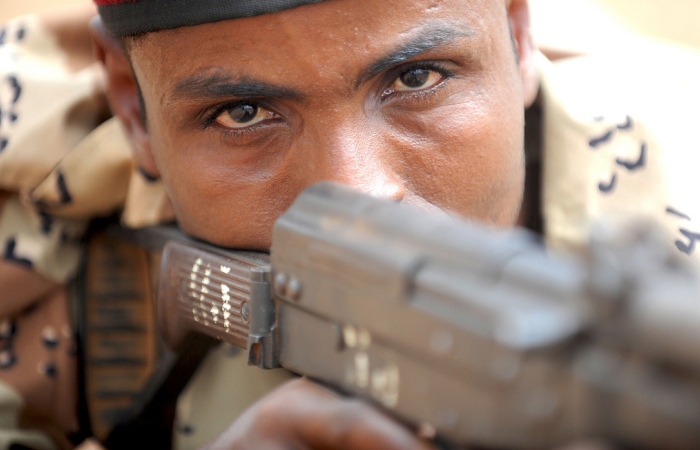
Photo CC-BY US Army Africa
Many think of Canada as a peaceful country and peace leader on the world stage. For this reason it is disconcerting to see that there appear to be very serious gaps in Canada’s real commitments to regulating arms exports.
In 2016 Canadian Quakers came to a collective position (PDF) about Canada’s involvement in the arms trade. This was based on data showing how arms sales were becoming an increasingly lucrative industry for Canada, and that buyers included countries with some of the worst human rights records in the world, such as Saudi Arabia.
The position states:
Today’s violence lies at the roots of violence in the future. This must end. We cannot stand by and do nothing, and we do not put our faith in Canadian weapons bringing peace.
We call on Canada not to sell arms to countries which may use these arms in violation of international law or to repress civilian populations. We call on Canada to sign and ratify the United Nations Arms Trade Treaty without further delay, and to share information about its involvement in the international arms trade in a thorough, timely, and transparent manner. As Friends, we hope Canada’s role can move from a backer of wars to a supporter of creative non-military actions to transform conflicts and build peace.
Canadian Friends Service Committee is a founding member of Project Plougshares, which, among other important work, has for many decades tracked and commented on Canada’s involved in the arms trade.
In 2019 Canada did acceded to the Arms Trade Treaty (ATT)—an international agreement seeking to regulate the trade in conventional weapons. Canada also adopted domestic law consistent with the Treaty.
Yet, disturbingly, this seems to have done little to curtail the problem of Canadian companies arming countries where there is a high likelihood that those weapons will be used to violate human rights.
How can this be allowed to persist? Part of the issue seems to be the role of the Canadian Commercial Corporation (CCC), a Crown corporation (i.e. a Canadian government-owned enterprise).
CCC signs contracts with foreign governments and also signs contracts with Canadian suppliers. More than half of these contracts are for military end-uses, and CCC doesn’t make anything itself, so effectively, CCC is most often an arms broker.
This makes CCC a very important actor in Canada’s arms export system. Yet it is not referenced at all in Canadian law related to export permits. This is a glaring omission!
Furthermore it’s entirely unclear what criteria are used by the CCC when it conducts human rights reviews of export contracts. It appears that CCC may take reviews for financial risks more seriously than it does reviews for human rights risks.
Take the heavily publicized case of Canada selling billions in light armoured vehicles (essentially tanks) to Saudi Arabia. Given Saudi Arabia’s poor human rights record, what happened is nothing less than scandalous.
CCC apparently satisfied its private internal criteria for human rights reviews and signed a contract with Saudi Arabia in early 2014—two years before the Canadian government (through Global Affairs Canada) did any human rights reviews.
In other words, a legal contract with heavy penalties for breaking it was entered into prior to any human rights review by anyone other than CCC. CCC and all other Crown agencies should be subject to the all obligations of the Arms Trade Treaty. But this is entirely absent in Canada’s Export Import Permits Act.
CCC could also play a significant role in improving Canada’s opaque and inadequate reporting on its involvement in the arms trade, in particular given that CCC is responsible for all military contracts with the Pentagon worth more than $150,000 US under the Defence Production Sharing Agreement (DPSA).
In addition to the lack of control over the CCC and the lack of transparency in reporting about arms exports, another major loophole remains. Canada can send military goods or goods with military end uses to the US without reporting on them or engaging in human rights reviews.
But the Arms Trade Treaty is meant to apply globally. It calls on parties to have “an effective and transparent national control system regulating the transfer of conventional arms.”
It’s tough to imagine how such a system will be possible for Canada while exempting the majority of Canadian arms exports, which go to the US and could be sent from there on to anywhere else in the world.
Civil liberties
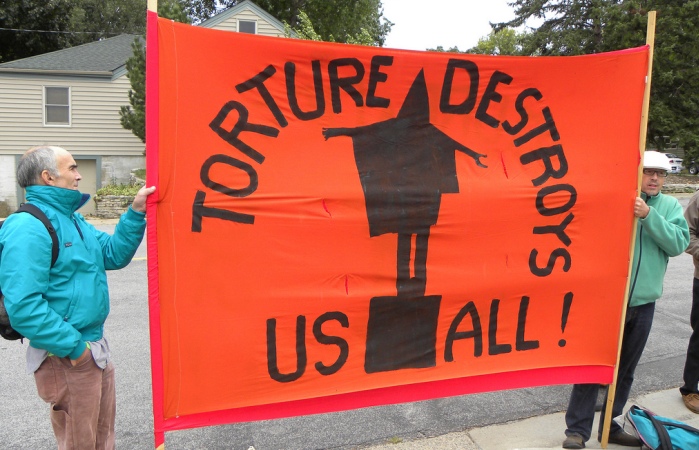
CC-BY Fibonacci Blue
In the wake of the September 11, 2001 attacks in New York and Washington, Canada, along with many other countries, enacted anti-terrorism legislation along lines recommended by the United States. Quakers joined other civil society groups to form the International Civil Liberties Monitoring Group (ICLMG) to examine Canada’s new anti-terrorism strategies.
We concluded that the new laws were developed to appease anxieties rather than to answer any evident need. Pre-existing Canadian and international law was already more than sufficient to provide reasonable security.
Both through intention and poor drafting, we found the legislation to be likely to have damaging effects. Sadly, we were right, and such effects continue to be witnessed and tracked by ICLMG today. These effects include the criminalization of dissent, “rendition” (i.e. removing people from Canada) to torture, and surveillance and assumed guilt of already vulnerable members of minority groups: immigrants, naturalized Canadians, refugees, Muslims, and Indigenous people.
The extent of warrantless mass surveillance with questionable security benefits was not fully known at that time, but our worst fears have since been confirmed by leaked intelligence documents from the US and Canada.
Our concerns over the lack of oversight and accountability of massive internet and phone surveillance programs caused CFSC to join with hundreds of civil society groups from around the planet in calling on Canada and other governments to adopt International Principles on the Application of Human Rights to Communications Surveillance.
Following the consensus of ICLMG members, we have joined in numerous cases and campaigns such as this. Individual Friends have also taken actions like standing surety for bail for persons accused based on secret evidence, attending court hearings to witness the struggle for due process, and contributing funds for humanitarian assistance and legal costs.
Read our 2016 submission to Canada’s National Security review (PDF) for details about our civil liberties concerns. See also our open letter in opposition to Canada’s Anti-Terrorism Act 2015 (better known as Bill C-51).
Stay up to date on civil liberties concerns from extra-judicial killings to no-fly lists by signing up for the regularly emailed News Digest of the International Civil Liberties Monitoring Group.
Climate change
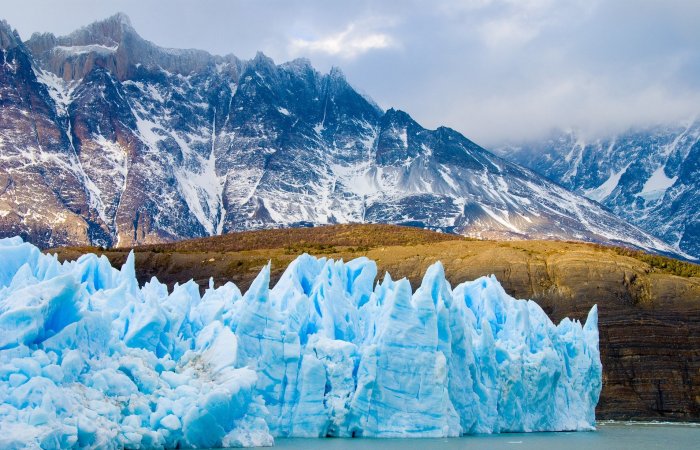 Climate change and the destruction of environments are very pressing crises. They impact every area of our peace and social justice work. In Canada environment and climate change work is being done by many dedicated groups with lots of expertise. We’re conscious of not duplicating their efforts or trying to “reinvent the wheel.” Instead, we work with partners to amplify our collective impact.
Climate change and the destruction of environments are very pressing crises. They impact every area of our peace and social justice work. In Canada environment and climate change work is being done by many dedicated groups with lots of expertise. We’re conscious of not duplicating their efforts or trying to “reinvent the wheel.” Instead, we work with partners to amplify our collective impact.
We’re involved with KAIROS, which brings together 10 Canadian churches to work on ecological justice.
We support the Quaker United Nations Offices, which have the human impacts of climate change as a focus area. They produce resources like A Government Official’s Toolkit: Inspiring Urgent Climate Action (PDF) and Climate Justice and the Use of Human Rights Law in Reducing Greenhouse Gas Emissions (PDF). They also collect and share information about Quaker work on climate change happening around the globe.
We work alongside Indigenous partners in their struggle for the full realization of Indigenous peoples’ human rights. This work often has an environmental and climate change related dimension—consider for example the Site C dam or various pipelines.
We support particular campaigns such as one >calling on the government of Canada to make Ecocide (mass destruction of the environment) an international crime.
Our work on peace and demilitarization is intimately connected to the climate. Sometimes we are led to discuss this directly (PDF) as part of our prophetic witness to governments.
Increasingly, groups from around the world are making the connection between climate change and militarism (PDF). In spite of their massive carbon footprints, the 2015 Paris Agreement left cutting emissions from the world’s militaries to the discretion of individual nations. Reporting of military emissions is voluntary.
We’ve joined organizations from many countries calling on NATO to transparently report emissions using clear methodology and to actually cut military emissions rather than making empty promises.
We urgently need to shift from the failed idea that yet more militarism can protect against violence and conflicts created by climate change. States have to cease to destroy living things through wars. And they have to redirect precious resources from militaries to addressing the climate crisis.
Our work on synthetic biology focused on the social, ethical, and spiritual dimensions of new and emerging technologies, encouraging deeper reflection on how we relate to the living world around us.
Where appropriate, we sign on to joint statements and write open letters to government on environmental issues from climate change to the accountability gap in the extractive industries.
CFSC makes individual grants available to Canadian Quakers with leadings on environmental care and other justice and peace issues.
Canadian Friends, with the support of their Meetings, often act under concern about climate change. In some cases Friends have been led to engage in nonviolent direct action, in the last resort even risking arrest for opposing environmental devastation as an expression of their faith and an act of love.
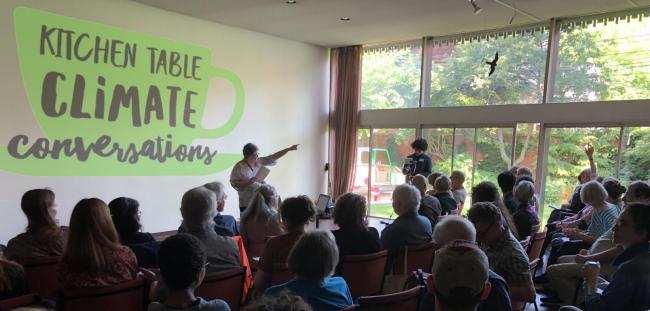
Lyn Adamson discusses Kitchen Table Climate Conversations at Friends House in Toronto
Individual Canadian Friends are also active with many environmental groups like Quaker Earthcare Witness. Toronto Friend Lyn Adamson is one example. Lyn is supported by Toronto Meeting to offer a program to Friends and other community and faith groups across Canada. Designed by ClimateFast in an initiative called Kitchen Table Climate Conversations, it has also been adopted by KAIROS and Citizens for Public Justice and developed into a faith-based model called Faithful Climate Conversations.
The conversation model is suitable for small groups, and focuses around sharing and consideration of solutions in response to the climate crisis. Lyn is available to arrange for facilitators for these conversations. If your group would like to offer one (or more), feel free to contact her.
Finally, Canadian Friends Service Committee uses investment screens that take climate change seriously. Our investments are 100% fossil fuel industry free as certified by 350.org. We also take measures to reduce our own carbon footprint and consider sustainability throughout our work. These measures include limiting travel as much as possible, recycling materials, and reducing our consumption of electricity and supplies in the CFSC office. When we do have to travel for our work, CFSC purchases “Gold Standard” carbon offsets (endorsed by major environmental groups like the David Suzuki Foundation).
Conscientious objection to military service
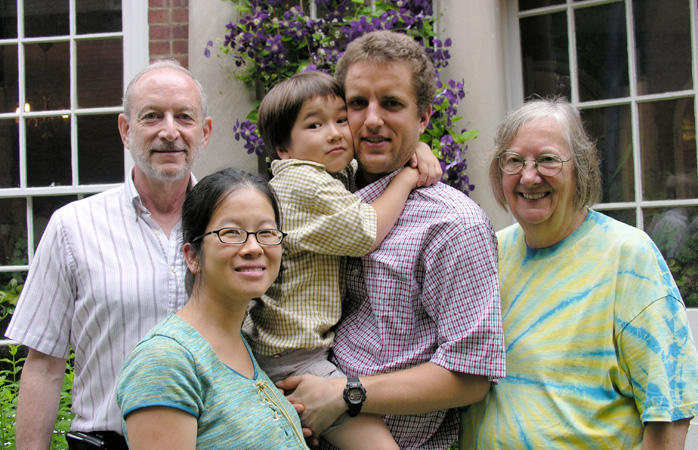
US conscientious objectors Jeremy Hinzman, Nga Nguyen, and son Liam are pictured with Charlie Diamond (CFSC representative to the War Resisters Support Campaign) and Anne Mitchell (Clerk, Canadian Yearly Meeting).
The pacifist witness of Friends goes back to our earliest days in England, when George Fox refused to accept a commission in the military in 1651 saying that he, “lived in the virtue of that life and power that took away the occasion of all wars,” and that he had, “come into the covenant of peace which was before wars and strifes were.”
Friends’ refusal to participate in war, or to fund war and militarism through taxes, has been witnessed to throughout our history. Our understanding broadened in the 20th century when we recognized that, as all of us are endowed with conscience, anyone can develop a conscientious objection to war. We may develop this conviction while serving in the military and experiencing war or preparations for war.
For a precise history of conscientious objection in Canada among the peace churches and others, read this short paper (PDF).
Vietnam
Friends assisted American men and women seeking refuge in Canada during the Vietnam War (1950s-70s), when the USA practiced conscription. Those arriving were both “draft dodgers” and “deserters.”
Several members of Halifax Monthly Meeting have shared their experiences of coming to Canada for reasons of conscience during the time of the Vietnam War:
Iraq War and securing rights of conscience
From 2003-2016 CFSC helped a new wave of US soldiers and their families when they came to Canada seeking refuge. Most of these young men and women served in Iraq (or Afghanistan) and developed their conscientious objection to the war (or all war) through their firsthand experiences.
CFSC worked in partnership with the Quaker United Nations Office (Geneva), Canadian church partners (the United Church of Canada and the Mennonite Central Committee Canada), and the War Resisters Support Campaign on helping the US War Resisters stay in Canada.
CFSC took particular interest in advancing the legal recognition of conscientious objection to war (or to a particular war), in a number of ways:
- as an expression of rights of conscience in Canada (as it is under international law—Article 18 in both the United Nations Declaration of Human Rights and the UN Convention on Civil and Political Rights);
- the recognition of military personnel as potentially legitimate refugee claimants under the UN High Commission for Refugees Handbooks (sections 169-174) which is used to assess refugee cases in Canada;
- the Rights of the Child in situations where war resisters who have children face removal (deportation) from Canada; and
- the differential punishment that US war resisters have faced if returned to the US (most deserters received administrative discharges; those who spoke out against the Iraq war received harsh prison sentences).
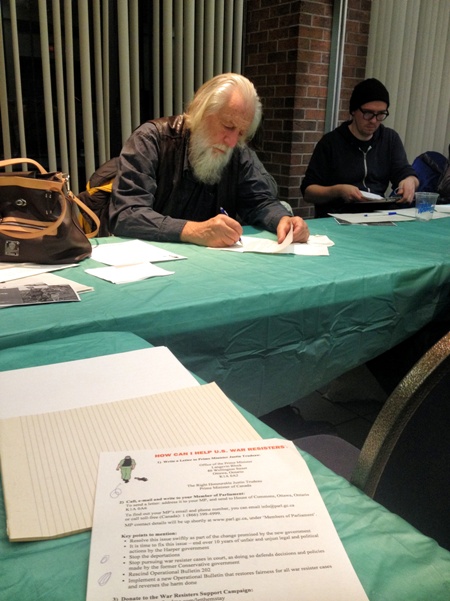
Our support for war resisters included coordinating material support through the Quaker community, encouraging Quaker engagement with elected representatives, providing letters to the court citing our concerns about process and legal issues, and preparing interventions raising substantial issues to raise with the court.
One case we prepared an intervention for (the Hinzman decision at the Federal Court of Appeal) set a vital new precedent—that, in humanitarian and compassionate grounds applications, the Minister of Immigration must consider the applicant’s sincerely held beliefs and motivations as a part of their personal circumstances.
CFSC also presented a brief to the House of Commons Standing Committee on Citizenship and Immigration in 2006. Two parliamentary motions supporting US war resisters being able to stay in Canada were approved by Parliament in 2008 and 2009, but the government refused to implement them.
Conscientious objection & international law
In some countries the form to apply for recognition as a conscientious objector is easy to find and anyone who submits it is automatically recognized with no further questions asked. In some countries COs do not have to do any alternative service. Yet in many places COs are harshly punished and CO status is extremely difficult to obtain. COs may not be legally recognized, be given long period of alternative service, or be imprisoned (sometimes many times for the same refusal to serve in the military). See this 2018 article we wrote to find out more about the challenges faced by people whose conscience will not allow them to serve in the military and possibly have to kill another human being.
If you’re interested in the legal status of conscientious objection and how it is implemented around the world, these resources are helpful, in particular the overview created by the Quaker United Nations Office (QUNO)-Geneva.
QUNO-Geneva resource: International Standards on Conscientious Objection to Military Service (revised 2021)
United Nations Human Rights Council report: Conscientious objection to military service (2017)
UN Guidelines on International Protection: Claims to Refugee Status related to Military Service (2013)
A Conscientious Objector’s Guide to the UN System (interactive) (2013)
UN Human Rights Office of the High Commission detailed publication: Conscientious Objection to Military Service (2012)
Find up to date information on CO issues from around the world via War Resisters International.
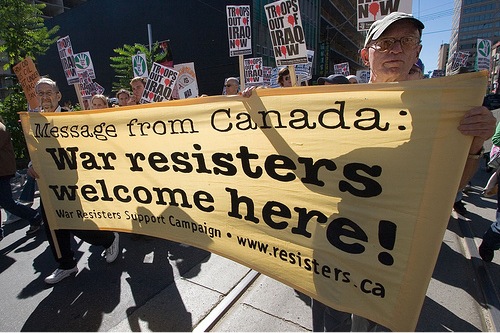
Canadian policy on conscientious objection
In the 1990s, CFSC, with Mennonite Central Committee Canada, pressed the Department of National Defence to put into place a process for Canadian military personnel who developed a conscientious objection to war. A policy and procedure was put into place in 2004, however it still does not include independent review of the application and does not meet the standards of international law.
In the 2000s, CFSC began addressing youth and militarism issues, producing a popular brochure used by local groups involved in counter-recruitment. Our approach has been to encourage reflection and critical thinking for those considering such a choice. For copies of the brochure contact us.
Conscientious objection to military taxation (“peace tax”)
Canadian Friends support conscientious objection to military taxation as a personal witness and CFSC employees can withhold war taxes on request. Friends in Canada have a 200+ year history of refusing to pay taxes for war.
People with a conscientious objection to having their taxes used for military purposes can register their objection by completing a Peace Tax Return at tax time each year. Conscience Canada, which produces the Peace Tax Return and does related work, was founded by Friends (Edith Adamson in particular) and others in 1978 in Victoria, BC. Individual Friends continue to volunteer with Conscience Canada.
Refugees
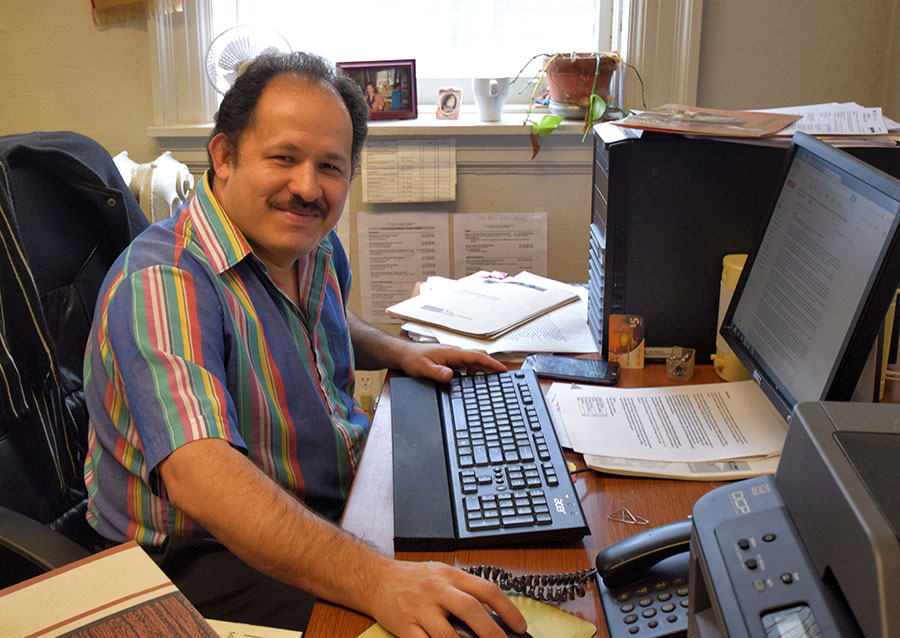
For decades (PDF) we’ve been clear that crossing an international border does not negate a person’s human rights. Refugee rights are human rights. Framings that talk about refugees as a “security risk” are deeply harmful to us all.
We do not offer refugee sponsorship. Our leading to support refugees instead caused us to become members of the Canadian Council for Refugees and to financially support the Quaker Committee for Refugees of Toronto Monthly Meeting. The Quaker Committee for Refugees offers all sorts of free support services for refugees and newcomers after they’ve arrived in Toronto. For those already in Toronto, call their staff person Eusebio Garcia at 416-964-9669.
Eusebio assists refugees and other migrants in:
- filing forms,
- applying for work permits,
- accessing healthcare coverage,
- obtaining necessary documents,
- connecting to legal services,
- finding housing,
- understanding educational options and openings,
- receiving employment training, and more.
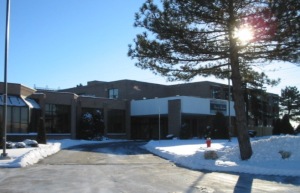
Immigration and Refugee Detention Centre, Rexdale
The Spring 2015 issue of our newsletter Quaker Concern (PDF) has a lead article by Eusebio about the journey that brought him to work for the Quaker Committee for Refugees. It provides some excellent background about the refugee support services CFSC helps finance.
In 2006, CFSC produced a discussion paper that lays out aspects of refugee rights issues that are still highly relevant today. We invite you to read Rethinking Security: Refuge, Power, and Privilege.
The Quaker Committee for Refugees also helps detainees at the Immigration and Refugee Detention Centre at Rexdale and Martin Grove in Toronto to meet legal requirements, obtain necessary additional documents, and access other services that may be of assistance. Friends have been visiting the Detention Centre weekly since the early 1990s, inspired by the example of Nancy Pocock, the founder of Toronto Monthly Meeting’s Quaker Committee for Refugees.

